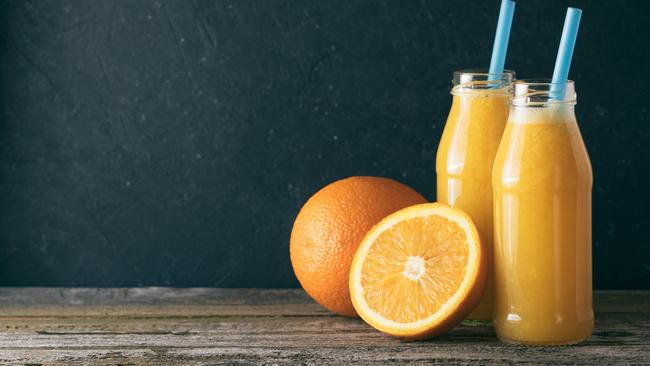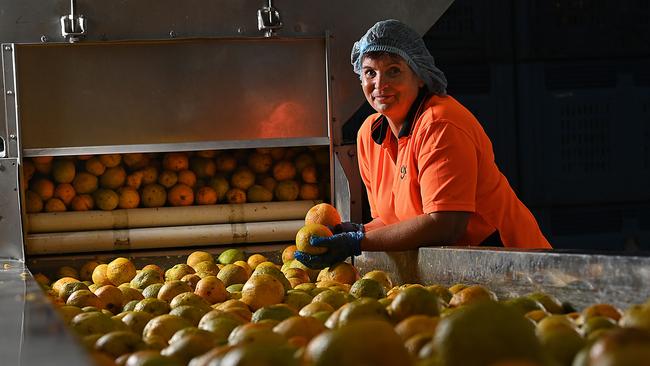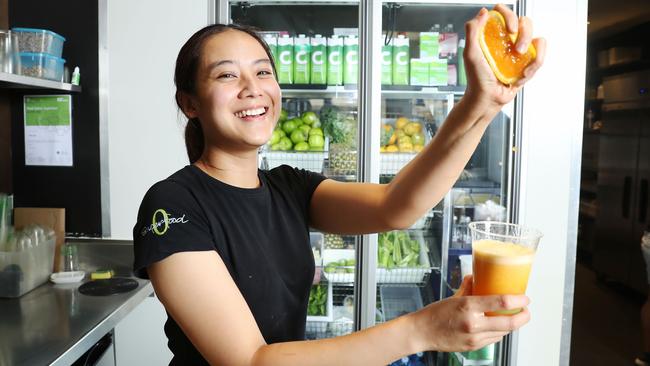Industry stewing in its own juice over sugar hit
A powerful anti-sugar campaign is targeting fresh juice with orange juice set to have the same government health star rating as Diet Coke.

Fresh orange juice is set to have the same government health star rating as Diet Coke.
Unless the fruit juice industry can convince ministers of Australian federal and state governments and New Zealand otherwise at a meeting on Friday, Aussie OJ will be a junk drink, despite its famous vitamin C.
A powerful anti-sugar campaign is targeting fresh juice in a battle that pitches rising obesity concerns in Australia against jobs and livelihoods in the bush.
“This is just another nanny state law,” says Moree citrus grower and juice manufacturer Dick Estens.
“Governments managing down on rural Australia, killing jobs and all these votes come in from these mad left city people, over-educated elites, that’s what’s causing it. It’s not common sense.”
The new rating of orange juice will be set by health and agriculture ministers who make up the Australia and New Zealand Ministerial Forum of Food Regulation. Of the 10 votes, Labor states are expected to back a lower rating and Liberal states to back farmers. With Western Australia abstaining, the crucial vote still being fought over is Queensland. The decision comes at a time when health ministers are at peak power in the COVID-19 crisis.
“It’s part of this whole push on obesity” says Mr Estens. “They want to lower the five-star rating of orange juice. We’ve always had five-star rating. They want to put it down to 2.5 stars with Diet Coke and it’s a joke.
“Orange juice was discovered by Alexander the Great in 300 BC, so for the last 2300 year it’s been a major source of vitamin C and controlling scurvy and it’s always been referred to as a super fruit, the orange, and now it’s been blamed for obesity.”

Mr Estens is a stalwart of the Moree community and rural Australia. He received the Order of Australia for the Estens report on telco services in the bush and founding the Aboriginal Employment Service.
In the past 12 years, Mr Estens has transformed 350ha of Moree country from cotton growing to Venetian orange groves. “I went to Queensland and bought a small juicing business, back in 2007, and then I came home and started planting oranges.”
As climate change bites, Mr Estens says his oranges can extract eight times the value from water than cotton. His Grove Juice company supplies all of the Coles private label, and most of Aldi Queensland and NSW
Grove Juice employs 140 people on farm and in the Warwick juicing factory, a $20m investment, but Mr Estens says all that is under threat. “We’re bringing in Pacific Islanders on employment, there’s a lot of people involved,” he says. Warwick has some of the highest youth unemployment in the state. “These mad left, they don’t want a mining industry, don’t want a food industry, most are employed by governments.”
The new Health Star Rating of one to five will set water at five stars. “Explain to me how water is more healthy that orange juice?” asks Mr Estens. ‘There’s no goodness in water.”
The industry accepts it has lost the water fight. It is now lobbying for orange juice to be four stars, but the push for 2.5 stars, the same level as Diet Coke, is being driven hard by the health sector.
Alexandra Jones from the George Institute for Global Health says the juice industry is mounting an eleventh-hour attempt to protect jobs but there is a more important heath issue at stake. She says there are myths to bust: “Natural doesn’t mean healthy. Mercury is natural, asbestos is natural. They know that consumers think natural means healthy but it doesn’t.”
Dr Jones says there has been a two-year process involving public consultation and an independent review by government appointed-consultant MP Consulting.

Mr Estens says the advice provided to the ministerial forum is wrong. First, natural sugar should not be treated like added sugar in drinks and, second, the importance of many other nutrients like vitamin C and folate have not been fairly weighted for a new health star rating. The advice centres on a health star rating calculator supported by Food Standards Australia and New Zealand, which is part of the federal government’s health portfolio.
Mr Estens’ partner and managing director of Grove Fruit Juice, Archer Walters, is outraged at the calculator, which considers sugar content and energy levels but not other nutrients like vitamin C.
“The proposed calculator for juice with no added sugar simply equals a confused consumer. That leads to reduced sales, which leads to reduced investment and job losses. And all in a post-COVID environment,” he says.
“Our main issue in Australia is not the vitamin intake, it’s overweight and obesity,” says Dr Jones.
“So the health star rating does not take into account vitamins and minerals. It gives a rating out of five based on things like salt, fat and sugar. In the drinks category, it is focused on sugar.”
So does Dr Jones think a glass of 100 per cent orange juice is just about as healthy as Diet Coke?
“According to dietary guidelines recommendations, yes” she replies. “And also in New Zealand, where dietary guidelines, which the health star ratings also has to be aligned with, definitely don’t recommend juice.”
Dr Jones says the proposed ratings for juices are not unfair because healthy juices could score up to four stars but that would not necessarily include 100 per cent fresh juice. “It could be 100 per cent but still be quite concentrated in sugar, but the ones that are lowest in sugar will still get four.”
To Mr Estens, Labor has drunk the kool-aid around obesity in the sugar debate. “It’s the over-educated left. So when I Google up Food Standards Australia, you find it full of university professors. We lead the OECD on creating welfare on mental health issues and what is happening in Australia is that we constantly manage to the lowest common denominator.”
Dr Jones cites World Health Organisation advice that sugar in juice is free sugar, the kind to be avoided in diets. Whole fruit contains more fibre, which the body breaks down more slowly.
“A bottle of juice might have the equivalent of five or six oranges in there. You would never sit down and eat six oranges, but you get the equivalent of the sugar from six oranges.”
Dr Jones points to government dietary guidelines, which recommend that if you can’t find whole or frozen fruit, then a 125ml serve of juice is occasionally healthy. In contrast, she says, the juice industry markets juice as a healthy choice every day for Australians.
Mr Walters, who also sits on the Beverage Council and chairs the Australian Juice Committee, is calling for fresh juice to receive an automatic four-star rating or failing that, a major review of the calculator.
Britain and the US have introduced a sugar tax on soft drinks, but they do not include pure fresh juice.



To join the conversation, please log in. Don't have an account? Register
Join the conversation, you are commenting as Logout